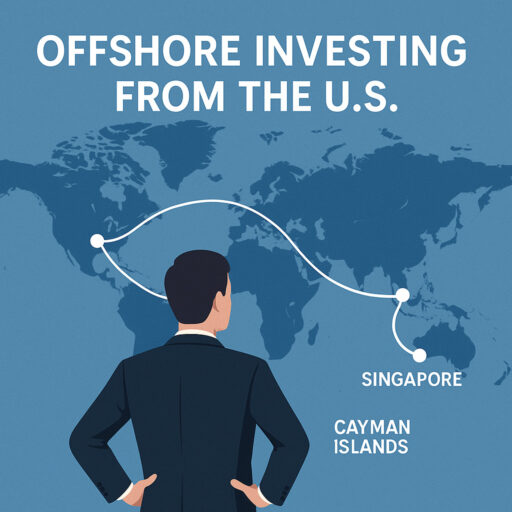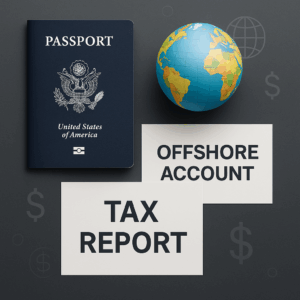Offshore investing from the US allows investors to diversify portfolios, access international markets, and potentially optimize returns.
Popular offshore investment options include offshore mutual funds, offshore investment bonds, and other global financial vehicles.
In this guide, we answer the most common questions US investors have about investing offshore, moving money, and managing offshore accounts:
- Can US citizens invest in offshore funds?
- Can US citizens have offshore accounts?
- Is an offshore account taxable?
- Moving money out of the US to an offshore account
- Can the US government seize offshore accounts?
- Is it worth having an offshore account?
My contact details are hello@adamfayed.com and WhatsApp +44-7393-450-837 if you have any questions.
The information in this article is for general guidance only. It does not constitute financial, legal, or tax advice, and is not a recommendation or solicitation to invest. Some facts may have changed since the time of writing.

Can a US investor invest in an offshore fund?
Yes, a US investor can invest in an offshore fund, but there are legal and regulatory considerations.
The fund must comply with US securities laws, and investors may need to fill out forms like FATCA disclosures.
Offshore funds can be accessed through offshore investment platforms or private placements, but US investors are still subject to US taxation on worldwide income.
Can you open an offshore account in the US?
Yes, a US resident can open an offshore account from the US by applying with international banks or offshore investment platforms that accept US clients.
The account itself must be located outside the United States, but US investors can complete the application remotely.
Banks may require proof of identity, US tax information (like FATCA forms), and compliance with local regulations.
You cannot create an offshore account physically in the US; it must be held in a foreign jurisdiction, even if you open it from the US.
Can the US tax offshore accounts?
Yes. The US taxes offshore accounts held by US citizens and residents.
Income, interest, dividends, and capital gains earned in offshore accounts must be reported on US tax returns, including Form 8938 (FATCA) and FBAR filings if certain thresholds are met.
How to move money offshore from the USA?
US investors can move money offshore via wire transfers to foreign bank accounts, through offshore investment platforms, or by opening accounts with international firms that accept US clients.
Transfers above certain thresholds must be reported to the US Treasury via FinCEN Form 114 (FBAR) and may trigger IRS reporting requirements.
Can the US government freeze offshore bank accounts?
Yes. The US government can freeze offshore bank accounts if they are linked to illegal activity, unpaid taxes, or sanctions violations.
Legitimate offshore accounts that comply with US tax and reporting laws are generally not at risk of being frozen.
How to withdraw money from an offshore account?
To withdraw money from an offshore account, US investors can use international wire transfers, ATM withdrawals (if the bank offers debit access), or transfer funds to a US bank account.
All withdrawals must be reported to the IRS if applicable, and investors may face foreign exchange fees depending on the bank or offshore investment platform used.
Offshore Investing Options
Investors looking for the best offshore investing from the US have multiple vehicles to access global markets. Popular options include offshore mutual funds and offshore investment platforms.

Best Offshore Investing from the US: Platforms and Funds
Offshore Investment Platforms
- Access to global markets: Provide a gateway to international stocks, bonds, ETFs, and mutual funds, often not available through US brokers.
- Compliance and reporting support: Help US investors comply with FATCA, IRS reporting, and other tax obligations, reducing regulatory risks.
- Multi-currency and flexible accounts: Many platforms offer multi-currency accounts, making it easier to hold and trade in different currencies.
- Ease of use: Platforms often feature online dashboards, mobile apps, and account management tools, simplifying global investing.
- Choosing a platform: Look for regulated providers, low fees, and robust customer support when selecting an offshore investment platform.
Offshore Mutual Funds
- Diversified portfolios: Allow US investors to spread risk across international markets while benefiting from professional fund management.
- Compliance with US law: Must be structured to comply with US securities and tax regulations, ensuring that all income and gains are reported correctly.
- Exposure to unique markets: Offer access to emerging markets, alternative investments, or sectors not widely available domestically.
- Investor suitability: Ideal for those seeking hands-off, professionally managed investments with moderate to long-term horizons.
Choosing Between Investment Platforms vs Funds
- Hands-on vs. hands-off: Use an offshore investment platform if you want direct control over individual investments; choose offshore mutual funds if you prefer a managed approach.
- Tax and reporting considerations: All offshore investments require disclosure to the IRS, so ensure your choice provides transparent reporting.
- Liquidity needs: Some funds may have lock-up periods or redemption restrictions; platforms often allow more flexible access to funds.
Why have an offshore account from the US?
US investors may choose to have an offshore account from the US to diversify investments, access international markets, protect assets, and potentially optimize returns.
Offshore accounts allow investors to hold foreign currencies and invest in international stocks or mutual funds.
Key reasons include:
- Diversification: Reduces reliance on US markets and spreads risk globally.
- Access to unique investment opportunities: Many offshore mutual funds and assets are unavailable domestically.
- Currency management: Hold and transact in foreign currencies, which can hedge against USD fluctuations.
- Estate and asset planning: Some investors use offshore accounts for succession planning and asset protection, while remaining fully compliant with US tax laws.
Key Takeaways
US investors can legally invest offshore, but must remain compliant with US taxation and reporting rules.
Using offshore investment platforms and offshore mutual funds allows diversification, but every step — from opening accounts to withdrawing money — requires careful planning to avoid penalties.
For those seeking the best offshore investing from the US, choosing a regulated, transparent platform is key. Working with an offshore investment advisor also help execute better strategies.
FAQs
How can I invest money outside the US?
US investors can invest money outside the US by purchasing foreign-listed securities, international real estate, or global ETFs directly through brokers that support cross-border transactions.
Another approach is to participate in joint ventures or partnerships with offshore companies. The key is to identify legitimate investment opportunities abroad.
What are the pros and cons of offshore investing?
Pros:
– Access to international markets and offshore mutual funds.
– Portfolio diversification beyond US-based assets.
– Potential currency hedging and tax-efficient planning (with proper compliance).
Cons:
– US taxation still applies on worldwide income.
– Reporting requirements like FBAR and FATCA add complexity.
– Some offshore accounts or funds may have higher risks and fees or limited liquidity.
How much can you invest offshore?
There is no legal maximum for US investors, but all offshore investments must be reported to the IRS if thresholds are met. For example:
– FBAR filing: Required if aggregate offshore accounts exceed $10,000 at any time during the year.
– FATCA reporting: Required for accounts exceeding $50,000 (single) or $100,000 (joint) at year-end.
Can US citizens have offshore accounts?
Yes, US citizens can have offshore accounts, either opened from the US or while abroad.
Accounts must be held in foreign financial institutions, and all income and balances must be reported to the IRS using FBAR and FATCA forms.
Legitimate offshore accounts are legal as long as compliance rules are followed.
How much foreign income is tax free for US citizens?
US citizens may qualify for the Foreign Earned Income Exclusion (FEIE), which allows up to $130,000 (for 2025, adjusted annually) of foreign earned income to be excluded from US taxation, provided certain residency or physical presence tests are met.
However, passive income from offshore accounts, dividends, and interest is not excluded and is fully taxable in the US.
Pained by financial indecision?

Adam is an internationally recognised author on financial matters with over 830million answer views on Quora, a widely sold book on Amazon, and a contributor on Forbes.



